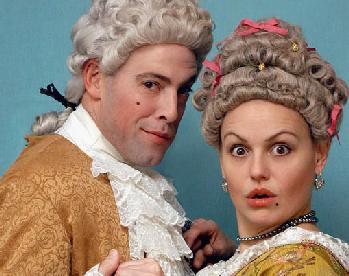SITE GUIDE
SEARCH
REVIEWS
FEATURES
NEWS
Etcetera and
Short Term Listings
LISTINGS
Broadway
Off-Broadway
NYC Restaurants
BOOKS and CDs
OTHER PLACES
Berkshires
London
California
DC
Philadelphia
Elsewhere
QUOTES
On TKTS
PLAYWRIGHTS' ALBUMS
LETTERS TO EDITOR
FILM
LINKS
MISCELLANEOUS
Free Updates
Masthead
Writing for Us
A CurtainUp DC  Review
Review
 Review
ReviewThe Game of Love and Chance
by Rich See
|
Handsome and put together. THAT'S what gets love going! -- Lisette
|
 I. M. Peakes and T. Beckman
(Photo: Claire Duggan) |
If you're looking for some old world fun with a European sensibilité, head over to Folger Theatre and check out The Game of Love and Chance. Written by Pierre de Marivaux, this French farce is a romp through social class consciousness, arranged marriage and love in the 18th century.
Considered France's greatest 18th century playwright, Pierre de Marivaux wrote between thirty to forty plays, mainly for the Comédie-Française (the only state run theatre in France, dating back to 1680). His The Game of Love and Chance centers on an arranged marriage in which the young man and woman who are to be betrothed, wish to survey their potential mate prior to agreeing to the union.
When their fathers agree to this innocent subterfuge, much havoc ensues as Silvia and Dorante set up an elaborate charade enlisting their personal servants to assist them. Silvia elects that her handmaid Lisette will masquerade as Silvia, while she, Silvia, will pretend to be Lisette. Meanwhile, Dorante has his manservant Harlequin portray him, as he, Dorante, becomes the embattled footman. The hope on each side is that Silvia and Dorante will be able to gain an understanding of the other's character by watching from the safe distance of the servants' quarters. But everything begins to unravel when the servants -- Lisette and Harlequin -- fall madly in love with each other while under the false assumption that they are being wooed by wealthy nobility.
In director Richard Clifford's hands, this campy production takes on a high-spirited energy that is infectious in its self-enjoyment and winks to the audience. Scenic designer Tony Cisek has created a lime green, two-tier set that offers plenty of opportunities for mad dashes and quick escapes. Covered with floral fabric patterns, the entire set is like a pop-up children's storybook picture.
Neil McFadden's sound design incorporates Italian operetta as a backdrop to the farcical nature of the piece, while Dan Covey's lighting incorporates blues and oranges (although there is a mirrored window effect, which reflects some spotlights and breaks your concentration). Kate Turner-Walker's costumes are elaborate, period pieces that look stately on the aristocrats and gauche on the servants.
The entire six-member cast stands out. Ian Merrill Peakes as Harlequin is wonderfully bold and rakish, while also charmingly inane and foolish. Tonya Beckman Ross' Lisette is vibrant, sweet, yet at times shallow and vampish. The chemistry between Mr. Peakes and Ms. Ross is terrific. As the comedic couple of the evening, they fill the bill perfectly with physical humor which brings laughs from across the audience.
In the more reserved roles of the well-to-do Silvia and Dorante, Tymberlee Chanel and Matthew Montelongo create a wonderful rapport while maintaining the appearance of noble origins. Ms. Chanel's Silvia is feisty and intelligent, but meets her match in the kind and adoring Dorante. For his part, Mr. Montelongo's Dorante is intelligent, respectful and charmingly befuddled by Silvia. Their time onstage pushes the story forward and also provides balance to the hijinks of Mr. Peakes and Ms. Ross.
In the roles of instigators to this madcap comedy, Timmy Ray James as Silvia's father Orgon and James O. Dunn as her brother Mario, seem to be enjoying their parts a great deal as they push Silvia to the breaking point and Dorante towards showing his hand. Mr. James and Mr. Dunn mug for the audience and provide some nicely timed comedic moments.
All in all, this production is an unexpected gem of a show full of laughs and well-timed pratfalls. If you are looking for sheer entertainment, but farce puts you off, this show offers some witty lines and great performances. It may show you that farce isn't all like a bad rerun of Three's Company.
|
The Game of Love and Chance
by Pierre de Marivaux, translated and adapted by Stephen WadsworthDirected by Richard Clifford with Tymberlee Chanel, James O. Dunn, Timmy Ray James, Matthew Montelongo, Ian Merrill Peakes, and Tonya Beckman Ross Scenic Design: Tony Cisek Sound Design: Neil McFadden Lighting Design: Dan Covey Costume Design: Kate Turner-Walker Running Time: 2 hours 30 minutes with one intermission Folger Theatre, 201 East Capitol Street, SE Telephone: 202-554-7707 http://www.folger.edu TUE - THU @7:30, FRI - SAT @8, SAT - SUN @ 2, SUN @7; $30-$49 Opening 04/07/06, closing 05/14/06 Reviewed by Rich See based on 04/22/06 performance |


